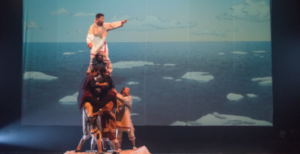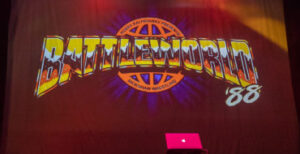Being slightly less than an expert in Peking Opera, I called upon the Wikipedia Gods to assist my understanding. They told me that the characteristic elements of this art form are music, vocals, mime, dance, acrobatics, a sparse stage, and movement that is suggested rather than realistic. King Lear, featured as part of the PuSh Festival at Vancouver’s Centre for the Performing Arts certainly achieved this. On the other hand, whether a discerning, opinionated, Shakespeare-loving theatre-goer such as myself can find satisfaction in the ‘suggestions’ of performance, is another story.
Wu Hsing-Kuo, of Taiwan’s Contemporary Legend Theatre, performs this solo performance to an 1836-seat auditorium that appears mostly entranced by what they are witnessing. Now as much as I hate to disagree with the New York Times who touted this show as “Remarkable…a probing psychological study of wavering identity”, I simply must. While the costumes were beautiful, the music authentic and eerie, and production quality high, I struggled to engage with the unspecific movements, disjointed vignettes of story, and prolonged scenes of no action such as nothing but fake snow falling from the rafters of the stage for almost seven minutes. Don’t get me wrong, I’m all for moments of meaning and simple beauty (the floating paper bag in ‘American Beauty’ – anyone?) but sometimes a line is crossed that takes us into the realm of pretense and makes me feel like I’m a villager left wondering why no one has noticed that the emperor is, in fact, stark naked.
The story of King Lear is beautiful and tragic, and deserves to be told well. I fear that we as a western audiences tend to be so entranced with the mysticism and style of eastern cultures, that we become distracted from what I feel theatre should be; an engaging depiction of a story. I personally want to be lost in the love and the pain, the betrayal of Lear’s daughters, the physicality and lightness of The Fool, and the sympathy we ultimately feel for this lost old man. I unfortunately felt none of these things, and obviously was outnumbered in this state as I sat quite still and disappointed while those around me rose for a standing ovation.
I don’t believe my feelings are unwarranted, or that I’m a close-minded, snobby, manifestation of my fast-moving ADHD generation. I am always looking to lose myself in the characters and relationships of performance, whether that is an experimental student Butoh dance piece or a hundred person musical spectacle, or a good old-fashioned kitchen-sink drama. This King Lear felt weak. It felt like a rough improvisational exercise that a first year theatre student could have devised on the spot, and the instructor still would have told them they lacked groundedness, emotional energy and real connection to the story.
I must say that Wu Hsing-Kuo worked extremely hard in his portrayal, and sang and spoke with a lovely clear projection. His creativity is certainly worthy of applause. I do think the concept of mixing traditional Peking Opera with the story and poetry of Shakespeare, is a brilliant and evocative concept that could deliver an exquisite experience. The CLT’s production of Macbeth set in the era of the Eastern Chou Dynasty certainly peaks my lust for theatrical magic and would have me coming back for a second taste of this ambitious fusion.









